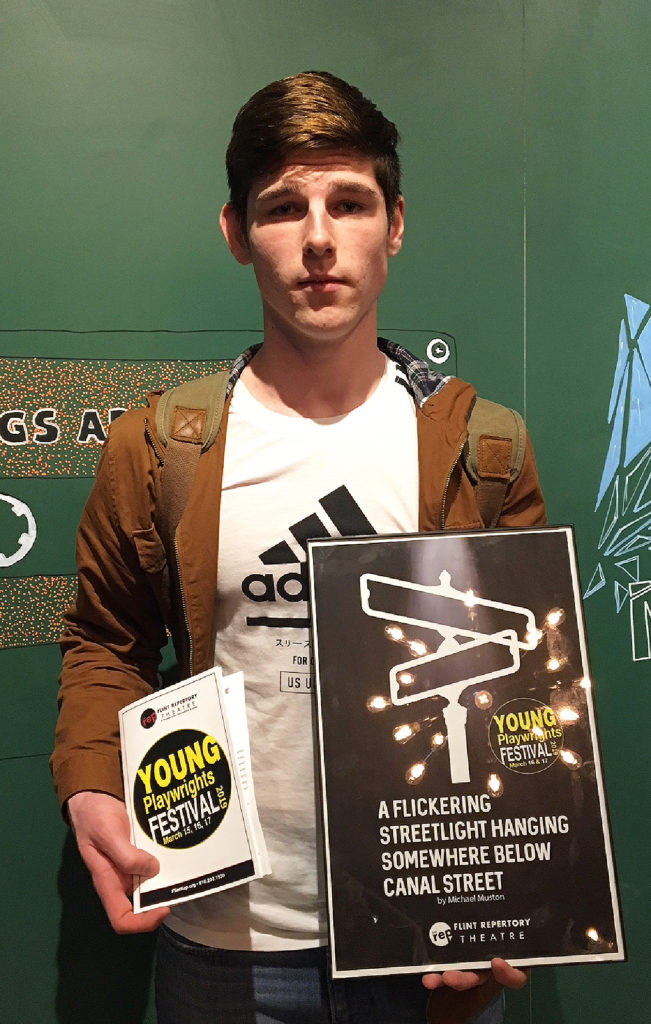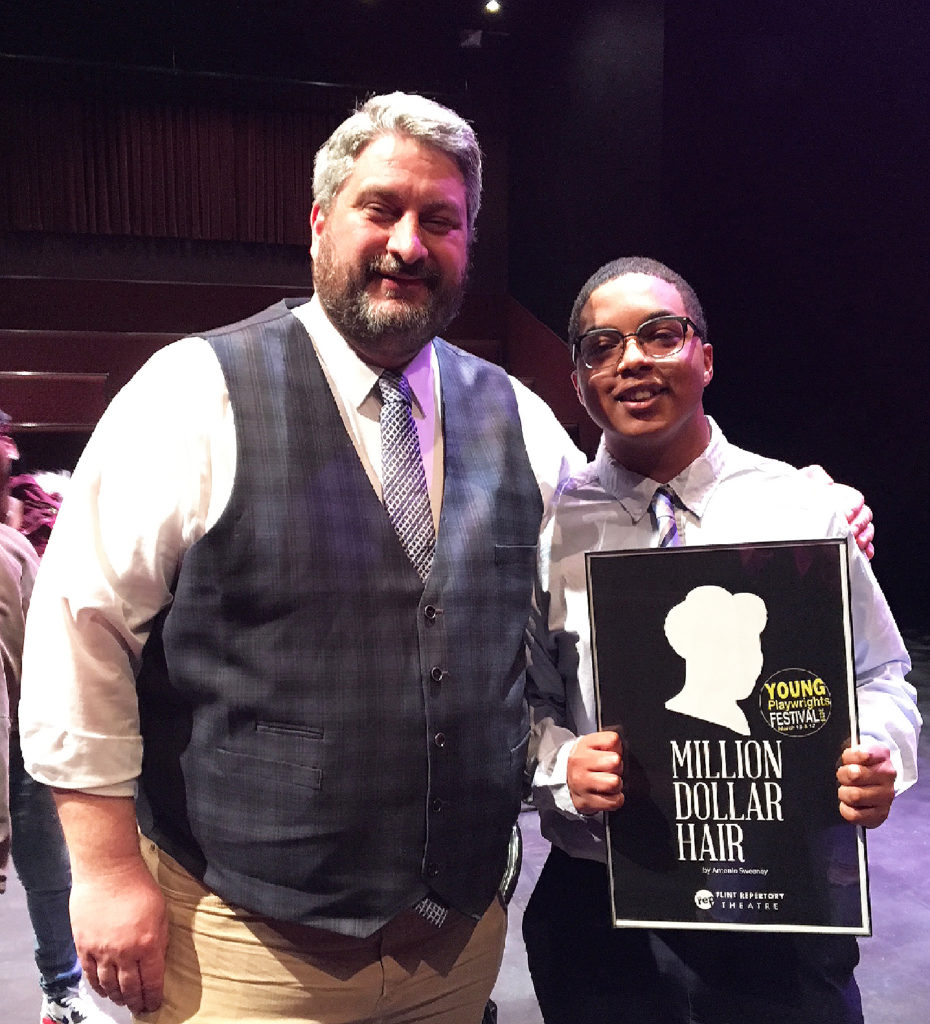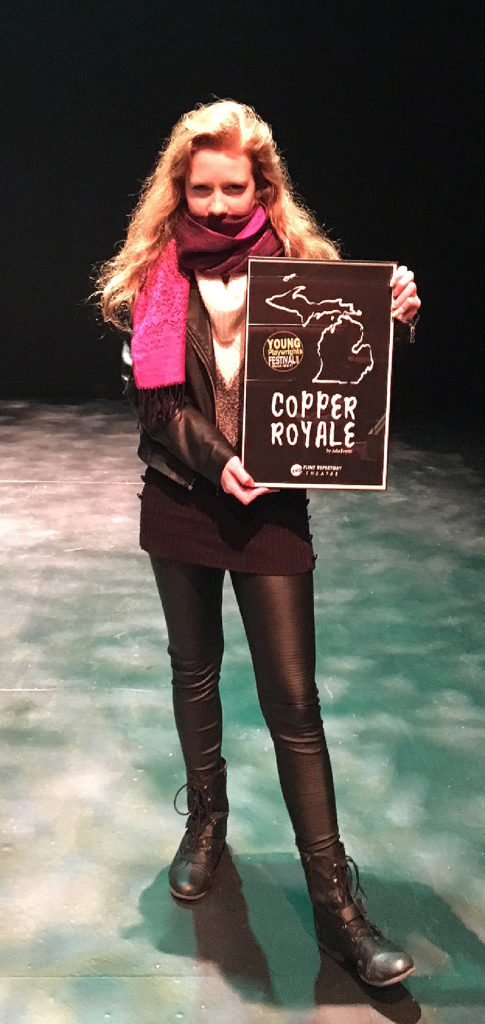By Patsy Isenberg
Four young playwrights, either getting to see their very first play read by actors or just getting started in their playwriting careers, were featured in the inaugural Young Playwrights Festival at the Flint Repertory Theatre (The Rep) over St. Patrick’s Day weekend.
The statewide contest invited submissions from any Michigan student 22 and younger in three categories, 10-minute plays, one-act plays, and full-length plays. The winners were a recent college graduate, Julia Everett of Beverly Hills, and three high schoolers: Lucas Guest from Rochester; Michael Muston of Lapeer; and the youngest, Antonio Sweeney, a ninth grader at Madison Academy in Flint.
The four plays, three one-acts and one full-length, were read by actors, many who’ve been in recent Rep productions, and other familiar faces from previous productions. While the first day was set aside for rehearsals, the public was invited to attend free readings on Saturday, March 16 and Sunday, March 17 in the Elgood Theatre. Sam Richardson, managing director of The Rep, said the festival attracted a total audience of about 180 over the two days.
The readings were conducted with no set pieces, costumes, special lighting or sound–just actors seated on folding chairs with music stands for their scripts. Artistic Director of The Rep, Michael Lluberes, interviewed each playwright after the reading, offered feedback, and invited questions from the audience.

Lucas Guest (Photo by Patsy Isenberg)
The first one-act play was “Under the Oak” by Lucas Guest, a junior at Rochester High School. According to the program, the play depicts how “two girls try to keep their friendship alive through years of struggle.”
Directed by Dakotah James, who had a busy weekend since she directed another one of the one-acts and also read a large part in the full-length play on Sunday, the play was tricky because the action takes place over several years. But it worked well.
The theme, like the other two on Saturday, centers around female characters. “Under the Oak” was read by an all-female cast. One of the main parts was read by Harvey, who was in the very recent Rep production of “The Wolves.”
Lucas thanked his parents for bringing him up with a “love for theater.” Lluberes asked Lucas how it felt to hear actors read through this, the first play he ever wrote, which was an assignment for a class in school. Lucas said, “ it was interesting hearing people actually take the characters and put life into them and I was just sitting in the rehearsal room in awe thinking, this is actually happening!”

Michael Muston (Photo by Patsy Isenberg)
The second one-act reading was “A Flickering Streetlight Hanging Somewhere Below Canal Street” by Michael Muston, a junior from Lapeer High School. This play, like the other two one-acts, features a female main character. It concerns a middle-aged woman in the 1940s who feels trapped in an unfulfilling marriage. She is sitting in a bar consumed by her thoughts while approached by two very different people. With a cast of only four, this one has two female roles and two male roles. Jason Briggs, another local actor who works as community administrator for The Rep, read one of the male roles. This was also directed by James.
Lluberes, commenting directly to the playwright on the surprisingly mature dialogue, said, “You know, Michael, we’ve read a lot of plays for this festival, and the language just bounced, and was so unique… that voice just sort of leapt off the page… who is this person?” “A Flickering Streetlight Hanging Somewhere Below Canal Street” was the first play Muston has ever written.
There’s a scene that takes place in Muston’s play when a man hits on the female main character and she strongly rejects his advances. An audience member commented on the idea of the young male playwrights writing such strong female characters and the issues women are confronted with. A male audience member said, “I just think it’s a really cool time to show that kind of guy because that happens to women every single day and it’s terrible.” Muston replied, “That’s part of the reason I put it in. Obviously, we’ve gotten a lot better with misogyny, but it was very prevalent back in older times.”
“Million Dollar Hair” was the last one-act reading of the day, written by Sweeney from Flint. As the program describes the play, “A grandmother tells the inspirational and bold story of Madam C.J. Walker along with her granddaughter and friends as they transition through history in a fun new way!”

Sam Richardson with Antonio Sweeney (Photo by Patsy Isenberg)
Madam C.J. Walker was the name of the company Sarah Breedlove founded early in the 20th century. It became very successful selling cosmetics and hair care products for black women at that time, and Breedlove became very wealthy.
When Lluberes asked Sweeney how he came up with the title, he said, “Well, me and my mom, we were like brainstorming and she says, ‘Antonio, how about Million Dollar Hair’ and I thought, hmmm, that does have a nice ring to it.”
‘Million Dollar Hair” had a unique structure due to being set in multiple time periods. The grandmother tells the story as she does her granddaughter’s hair. Various re-creations of historic events that she talks about come alive on another part of the stage and are played by the same actors.
It too was an all female cast and even the roles of men in the historical recreations were intentionally played by the women characters. It was directed by managing director and instructor Sam Richardson.
“I wanted to focus on African Americans who’ve done a lot of things and don’t really get credit for them,” Sweeney said. In describing his research for the play and choosing who to focus on, he said, he and Richardson were going down a list and when they came across Sarah Breedlove, known as Madam C.J. Walker, his reaction was. “Okay, I have to choose this lady because she’s like, awesome.”
About Sweeney, Richardson said, “this kid’s incredible.” He went on to explain how he came into his office on a regular basis for help with the writing of his play, persevered like a trouper, and is extremely bright. Richardson said he was happy to help.
It’s remarkable these three young men, all high school students, took themes like these–timely, feminine, mature and with such tricky structures–and were up to the task of crafting plays that were so good they were chosen for the festival.
 Sunday brought the full-length play “Copper Royale” by Julia Everett. As Everett describes it on her website, www.julia-everitt.com, “Mysterious events plague two separate copper mining missions, one in 1847, and one in 2017. Where could that roaring and these bizarre copper scales be coming from?” The play takes place in and on the shores of Lake Superior. Into her Michigan narrative, she weaves a mythological story.
Sunday brought the full-length play “Copper Royale” by Julia Everett. As Everett describes it on her website, www.julia-everitt.com, “Mysterious events plague two separate copper mining missions, one in 1847, and one in 2017. Where could that roaring and these bizarre copper scales be coming from?” The play takes place in and on the shores of Lake Superior. Into her Michigan narrative, she weaves a mythological story.
Everett is originally from Beverly Hills, Michigan but attended the University of Iowa where she recently received bachelor’s degrees in English and economics with a minor in theatre arts. She said she was “super excited” to finally be able to share her playwriting work in her home state of Michigan.
This reading was directed by Bret Beaudry and included three cast members from The Rep’s production of “Assassins,” Mary Paige Rieffel, Briggs and Mark Gmazel, Everett is forging toward a playwriting career full force; she said she has written 27 stage plays of various lengths so far.
When Lluberes asked Everett where the play came from and where she got the idea for it, she said she wrote it as her undergraduate honors thesis and got the idea from a playwriting contest looking for plays on Great Lakes legends. She said she liked the legend of Mishipeshu and the wreck of the SS Edmund Fitzgerald. But she said there isn’t a lot of factual information in her play–it mostly came from her imagination.
Richardson presented each playwright with a framed unique custom-designed graphic of their plays to commemorate the festival and thank them for their participation.
The festival program booklet included this statement: “This program and/or service is funded in whole or in part by the Genesee County Arts Education and Cultural Enrichment Millage funds. Your tax dollars are at work.” The comment refers to the $8.7 million/year in funds allocated to arts initiatives in Genesee County through a successful vote last August. Funds have begun finding their way for the first time into arts agencies starting with winter taxes.
EVM staff writer Patsy Isenberg can be reached at pisenber@gmail.com.


You must be logged in to post a comment.